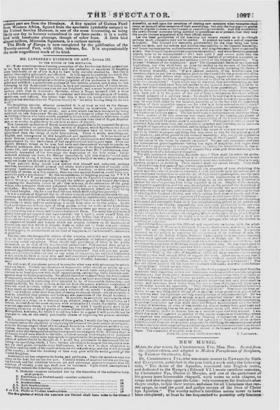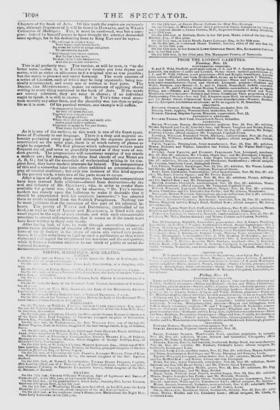NEW MUSIC.
Motets for ji,ur voices, by CHRISTOPHER TYE, Miss. Doc. Scorrd front the original edition, and adapted to Modern Paraphrases of Scripture, by THOMAS 01,1PHAN17, Eng.
Dr. CHRISTOPHER TYE, who was music-master to EDWARD the Sixth and ELIZABETH, published in the year 1563, a work under the following title, " The Actes of the Apostles, trantlated into Engli,h metre, and dedicated to the Kynge's ( Edward VI.) moste excellent majesty., by Christopher 'rye, Doctor in Musyke, and one of the gentylusen of his graces most honourable chappell, wyth notes to eche chapter, to synge and also to play upon the Lute : very necessarye for Students after theyre studye, to fyle their wyttes, and algae foe all Christians that MM. not synge, to read the good and godlye storyes of the lives of Christ bye Apostles." The worthy author's intention seems' never to him been completed; at least he has bequeathed to posterity ortty-fotutemv Chapters of the book cf Acts. Of this work the copies are extremely rare, although fragments of it will be found in IlsweiNs, and in Ween's Collection of Madrigal-i. TYE, it must be confessed, was but a sorry poet : indeed he himself seems to have thought the attempt demanded some apology, for in his dedicating lines to King EDWARD he says- - My catty nge is another waye, Your G Lace shall herein fe tele. By notes set Nellie to eynge and idaye,
To recreate the me ode.
" And though they be not curious. But for the letter mete, Ye shah them fe. ode harmonione. And eke pleaeaunt and sweat.'
This is all perfectly true. The version, as will be seen, is "to the letter mete,"—that is, it is TYNDALE'S version put into rhyme and metre, with as strict in adherence to tl e original text as was possible; but the music is pleasant and sweet harmony. The work consists of a series of Chorales, each of which may be sung separately, being mu. eically unconnected, and every one is written in four parts. The Doctor, like MENDELSSOHN, makes no ceremony of applying choral writing to every thing contained in the book of Acts. If the words are tnereiy narrative, they are sung in chorus; if an individual ought to speak, it is still in chorus. But in TYE'S time vocal music took scarcely any other form, and the absurdity was not then so palpa- ble as it is now. Of his poetical version, one example will suffice,
ft cliauuced in lcunium,
As they eft times tied use,
Together they lido tl)ti cum The Sinagoge diem : Where they ilvil preache and onely seke God's grace then to atcheve, That they so spake to Jur and Grake, That many beleve."
As it is one of the earliest, so this work is one of the finest speci- mens of Psalmody in our language. There is a deep and majestic so- lemnity pervading every page ; and although the separate pieces are constructed on the same plan, there is as much variety of phrase as might be expected. We find phrases which subsequent writers made frequent use of, and some as gracefully turned as if they were of rim- dem growth. The progressions will sometimes surprise if not startle a modern ear; for example, the three final chords of one Motet are A, B, G ; but in all the essentials of ecclesiastical writing in its sim- plest.form, they leave modern attempts far behind. The compositions of this and a somewhat later time often exhibited an ostentatious dis. play of musical erudition ; but only one instance of this kind appears in the present work, where two of the parts move in canon. After a lapse of nearly three centuries, these beautiful compositions have been rescued from oblivion—almost from destruction—by the zeal and industry of Mr. OLINIANT; who, in order to render them available for general use, (for, as he observes, " Dr. TYE'S version borders too closely upon the ludicrous to make it desirable that it should be perpetuated with his exquisite harmonics,") has adapted them to words selected from the Scottish Paraphrases. Nothing can be more judicious than the execution of this part of his editorial la- bours. The poetry of 11 Ana' and DODDRIDGE, (unrivalled of its kind,) as well as that of LOGAN and BLACK LOCK, is fitted with such exact regard to the style Qf reeli chorale, and with such commendable attention to accent and expression, that it seems as if the music must lave been written to these very words. After having Lad, of late, to wade through successive volumes of psalm.tunes, consisting of abortive efforts at composition or exhibi- tions of (lat. ly foolery in the sirpe of opera airs carved into psalm. tunes, it i- (iaite refreshing to 1:ght on such a publication as this, which claims and v..11 regard the ettention of the musician und the Itittiquarian, while it fonns a welcome additien to our stock of public or social de- votiolial Ii at mony.



















































 Previous page
Previous page